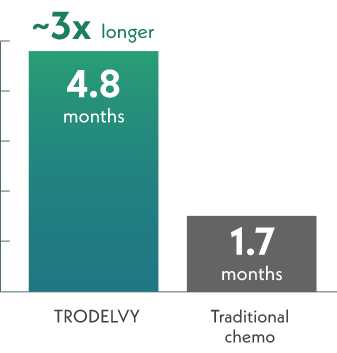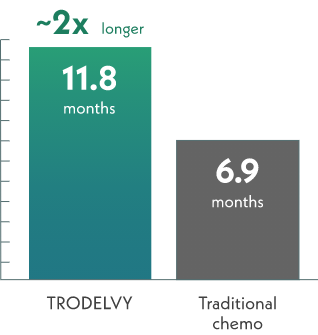Clinical trial results in mTNBC
TRODELVY was tested in a large phase 3 clinical trial

Researchers tested TRODELVY in a phase 3 clinical trial of 529 adults comparing TRODELVY to traditional chemotherapy in previously treated* patients to find out if TRODELVY would:

- The researchers selected the type of chemo they received
- Types of chemo included eribulin, capecitabine, gemcitabine, or vinorelbine

All patients had been previously diagnosed with mTNBC, and had received
- At least 1 of these therapies was specifically for metastatic breast cancer.
* Additional criteria included:
Patients with known Gilbert’s disease or bone-only disease were not included.
12% of the patients in the study had cancer that had spread to their brain, which was previously treated and stable.
All patients previously received taxane treatment.

TRODELVY is an intravenous infusion.
In the clinical trial, patients who were given TRODELVY received 10 mg/kg on days 1 and 8 of a 21-day treatment cycle.
Researchers determined when to stop TRODELVY treatment depending on how patients were responding to and tolerating treatment.
Interested in TRODELVY?
If you have received 2 or more treatments for triple-negative breast cancer and at least 1 of those treatments was for metastatic breast cancer, TRODELVY may be an option for you. Create a plan today for asking your doctor about TRODELVY.
TRODELVY helped patients live longer than traditional chemotherapy
Half of those receiving TRODELVY lived without cancer progression almost 3x longer

Traditional chemotherapy = 262 patients
This result is called median progression-free survival (PFS), which is how long a treatment stops the growth or spread of mTNBC in half of the people who take it.
TRODELVY
Half of those who received TRODELVY lived with no sign of cancer progression for almost 5 months.
Traditional chemo
Half of those who received traditional chemo (eribulin, vinorelbine, gemcitabine, or capecitabine) lived with no sign of cancer progression for nearly 2 months.
Half of those receiving TRODELVY lived about 2x longer

This result is called median overall survival (OS), which is how long half of the people are alive after starting treatment.
TRODELVY
Half of those who received TRODELVY lived nearly 12 months.
Traditional chemo
Half of those receiving traditional chemo lived for nearly 7 months.
Results shown are in all patients (with and without brain cancer). Individual results may vary and TRODELVY may not work for everyone.
TRODELVY® (sacituzumab govitecan-hziy) is a prescription medicine used to treat adults with triple-negative breast cancer (negative for estrogen and progesterone hormone receptors and HER2) that has spread to other parts of the body (metastatic) or cannot be removed by surgery, and who have received two or more prior treatments, including at least one treatment for metastatic disease.
It is not known if TRODELVY is safe and effective in people with moderate or severe liver problems or in children.
Important Safety Information
TRODELVY can cause serious side effects, including low white blood cell count and diarrhea:
Tap for Important Safety Information. TRODELVY can cause serious side effects, including low white blood cell count and diarrhea:
- Low white blood cell count (neutropenia) which is common and can sometimes be severe and lead to infections that can be life-threatening or cause death. Your healthcare provider should check your blood cell counts during treatment. If your white blood cell count is too low, your healthcare provider may need to lower your dose, give you a medicine to help prevent low blood cell count with future doses of TRODELVY, or in some cases may stop TRODELVY. Your healthcare provider may need to give you antibiotic medicines if you develop fever while your white blood cell count is low. Call your healthcare provider right away if you develop any of the following signs of infection: fever, chills, cough, shortness of breath, or burning or pain when you urinate.
- Severe diarrhea. Diarrhea is common and can be severe. Severe diarrhea can lead to loss of too much body fluid (dehydration) and kidney problems. Your healthcare provider should monitor you for diarrhea and give you medicine as needed to help control it. If you lose too much body fluid, your healthcare provider may need to give you fluids and electrolytes to replace body salts. If you develop diarrhea during your treatment with TRODELVY, your healthcare provider should check to see if it may be caused by an infection. Your healthcare provider may decrease your dose or stop TRODELVY if your diarrhea is severe and cannot be controlled with anti-diarrheal medicines.
- Call your healthcare provider right away the first time that you get diarrhea during treatment with TRODELVY; if you have black or bloody stools; if you have symptoms of dehydration, such as lightheadedness, dizziness, or faintness; if you are unable to take fluids by mouth due to nausea or vomiting; or if you are not able to get your diarrhea under control within 24 hours.
Do not receive TRODELVY if you have had a severe allergic reaction to TRODELVY. Ask your healthcare provider if you are not sure.
Allergic and infusion-related reactions which can be serious and life-threatening. Tell your healthcare provider or nurse right away if you get any of the following symptoms during your infusion of TRODELVY or within 24 hours after: swelling of your face, lips, tongue, or throat; hives; skin rash, itching, or flushing of your skin; fever; difficulty breathing or wheezing; lightheadedness, dizziness, feeling faint, or pass out; or chills or shaking chills (rigors).
Nausea and vomiting are common with TRODELVY and can sometimes be severe. Before each dose of TRODELVY, you will receive medicines to help prevent nausea and vomiting along with medicines to take home with instructions about how to take them. Call your healthcare provider right away if you have nausea or vomiting that is not controlled with the medicines prescribed for you. Your healthcare provider may decide to decrease your dose or stop TRODELVY if your nausea and vomiting is severe and cannot be controlled with anti-nausea medicines.
Before receiving TRODELVY, tell your healthcare provider about all of your medical conditions, including if you:
- have been told that you carry a gene for UGT1A1*28, which can increase your risk of getting side effects with TRODELVY, especially low white blood cell counts, with or without a fever, and low red blood cell counts.
- have liver problems.
- are pregnant or plan to become pregnant. TRODELVY can harm your unborn baby. Your healthcare provider should check to see if you are pregnant before you start receiving TRODELVY. TRODELVY may cause fertility problems in females, which could affect your ability to have a baby. Talk to your healthcare provider if fertility is a concern for you.
- Females who can become pregnant should use effective birth control during treatment and for 6 months after your last dose of TRODELVY. Talk to your healthcare provider about birth control choices that may be right for you during this time. Tell your healthcare provider right away if you become pregnant during treatment with TRODELVY.
- Males with a female partner who can become pregnant should use effective birth control during treatment and for 3 months after your last dose of TRODELVY.
- are breastfeeding or plan to breastfeed. It is not known if TRODELVY passes into your breastmilk and can harm your baby. Do not breastfeed during treatment and for 1 month after your last dose of TRODELVY.
Tell your healthcare provider about all the medicines you take, including prescription and over-the-counter medicines, vitamins, and herbal supplements. Certain medicines may affect the way TRODELVY works.
The most common side effects of TRODELVY include decreased white blood cell (leukocyte and lymphocyte) and red blood cell counts, feeling tired or weak, hair loss, constipation, increased sugar levels in the blood, decreased protein levels (albumin) in the blood, decreased appetite, changes in kidney function test, increased levels of enzyme called alkaline phosphatase in the blood (test for liver or bone problems), and decreased levels of magnesium, potassium, and sodium in the blood.
These are not all of the possible side effects of TRODELVY. Call your doctor for medical advice about side effects. You are encouraged to report negative side effects of prescription drugs to the FDA. Visit www.fda.gov/medwatch, or call 1-800-FDA-1088.
Please click to see Important Facts about TRODELVY, including Important Warning.


